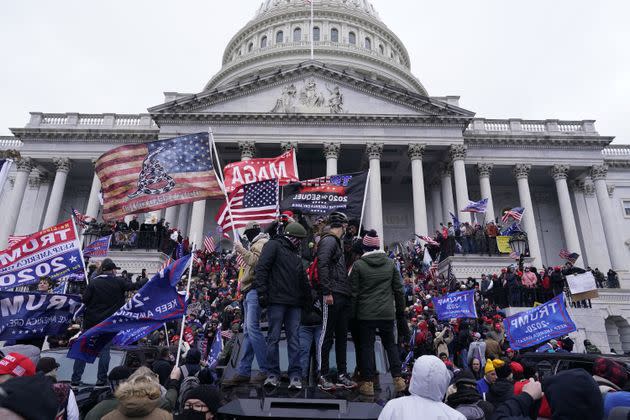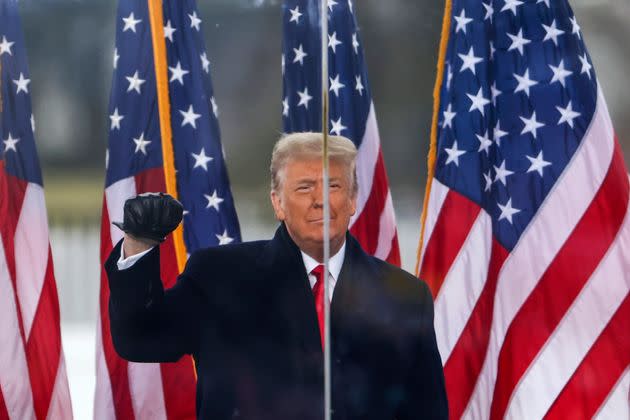On January 6, 2021, Joseph Fischer, along with more than 2,000 others, allegedly entered the U.S. Capitol in an attempt to stop the counting of electoral votes, which was already underway.
Fischer was not there in his official capacity as a police officer with the North Cornwall Township Police Department in Pennsylvania. He was there to, according to text messages he sent that were later cited in a filing by Justice Department lawyers, “drive the Democratic Congress to the gallows.”
“Can’t vote if they can’t breathe..lol,” Fischer reportedly wrote about his plans in another text message before January 6.
Fischer, according to federal tax documents, pushed his way into the building with shouts of “Charge!” Once inside, he crashed into a line of police officers, according to a cellphone video he recorded. Fischer and at least one police officer were knocked to the ground. Police removed him four minutes later.
Later identified by one of his colleagues, Fischer was arrested by federal agents on February 19, 2021. He was charged with multiple crimes but has yet to appear in court. That’s because he has appealed one of his charges all the way to the Supreme Court, which will hear arguments on April 16.

At issue is a law that makes it a criminal offense if someone “corruptly… obstructs, influences or impedes, or attempts to do so, any official proceeding.” This law – known as 18 USC 1512(c) – was enacted as part of the accounting reform law passed in 2002, in the wake of the Enron and Arthur Andersen scandals. Federal prosecutors have used it to charge 330 people involved in the Jan. 6 attack on the Capitol, including Fischer — and former President Donald Trump.
Fischer argues in his appeal that the provision was not intended to be used in this way. Instead, he claims, a full reading of the law text shows that it applied only to the corrupt obstruction or obstruction of documents in an official proceeding. This view revolves around the word ‘other’ in the provision, which reads (emphasis added):
(c) Anyone who is corrupt –
(1) alters, destroys, mutilates, or conceals any record, document, or other object, or attempts to do so, with the intent to affect the integrity or availability of the object for use in an official proceeding; or
(2) otherwise obstructs, interferes with or impedes any official proceeding or attempts thereto,
shall be fined under this title or imprisoned for a term not exceeding twenty years, or both.
The main points of contention that emerged in lower courts were how to define the word “other” and how it connects the first subsection to the second.
Fourteen district judges upheld the charge of obstructing an official proceeding in January 6 insurrection-related cases, with the understanding that “otherwise” means “in a different manner.” This would mean that the wording of the first paragraph, which relates to the destruction of documents, has no influence on the second paragraph.
But in an appeal to dismiss the same charge when it was filed against defendant Garret Miller on Jan. 6, D.C. District Judge Carl Nichols came to a different conclusion.
In his March 2022 decision, Nichols wrote that the word “otherwise” imposes a limit on the second subsection, and “requires that the defendant has taken some action with respect to a document, record, or other object to corruptly obstruct, obstruct or interfere with an official proceeding.”
Because Miller did not attempt to obstruct an official proceeding regarding any document, Nichols wrote, the charges against him were dismissed.
Nichols referred to his decision in Miller’s case to similarly dismiss charges against Fischer.


On appeal, a majority of a panel for the DC Circuit Court of Appeals disagreed. That ruling determined that the word “otherwise” should instead be defined by its “ordinary, dictionary meaning” as “in another manner” and that the “impediment” prohibited by law therefore does not apply exclusively to document-related crimes.
The Fischer subsection was indicted on charges “applicable to all forms of corrupt obstruction of an official proceeding, other than conduct already covered by” the first subsection, Judge Florence Pan wrote in an opinion joined in part by Judge Justin Walker .
However, the appeals court panel did not fully agree. Judge Gregory Katsas disagreed, siding with Nichols’ interpretation that “different” meant “in a manner similar to.”
Katsas’ argument draws on an earlier court precedent from the 2015 case Yates v. US, which established that the definitions of words in legal language should not be interpreted so broadly as to deviate from the underlying purpose of the law in matter.
Because the provision Fischer is accused of violating was enacted as part of a corporate accounting reform law intended to close a legal loophole in charges of obstruction of document shredding, the word ‘other’ are interpreted as operating within that larger context. than creating a much broader new type of crime.
“My colleagues recognize the discrepancy, but consider it irrelevant because the governing text is unambiguous,” Katsas wrote. “But the text is ambiguous, and this discrepancy is another reason to resolve the ambiguity in defendants’ favor.”
A decision in Fischer’s favor would not only dismiss this charge from his prosecution, but also overturn convictions or dismiss the same charges against 330 other participants in the January 6 uprising. That includes Trump, who was charged with four counts related to his actions on and leading up to January 6, including obstructing an official proceeding.
However, if his charge of obstructing an official proceeding were dismissed, it would not affect the other three charges Trump faces in the federal case, which is being brought by special counsel Jack Smith.
A trial in that case is currently on hold while Trump seeks a Supreme Court ruling on whether presidents have “absolute immunity” from criminal prosecution for official acts committed while in office. The court will hear arguments in that case on April 25 and could not rule until June 30. If the court were to side with him there, all of Trump’s charges would be dismissed.






